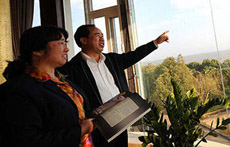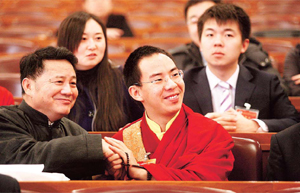Voice from Hong Kong
Updated: 2010-03-03 14:37
South China Morning Post: Beijing in confident mood 02/03
With the Western world dazed by banking and property collapses, China still had a purse full of money as the superlatives kept coming last year. For the first time in history, China had the richest banks in the world, the largest phone companies, the biggest internet population, the most nuclear power plants under construction and possibly the biggest middle class.
Indeed, the year also saw the world's most populous nation begin to wield its new political and economic influence as an emerging global superpower, when attention was less on China's rise than it was on what the country would do now that it had arrived.
"The newly confident tone going into the Copenhagen summit on climate change suggests that 2010 will see China continue to flex its fresh political muscle," said Jin Canrong , associate dean of Renmin University's School of International Relations.
Despiteall the challenges ahead, most domestic and international institutions are upbeat about the country's economic growth prospects, with most forecasting that China will achieve growth of between 9 per cent and 11 per cent this year.
The World Expo in Shanghai would again bring the world to China, and it was poised to be another spectacular showcase for China's achievements. "The message will remain one of how China's rise is characterised by soft power," Jin said.
South China Morning Post: Education spending target set for 2012 01/03An interdepartmental work group under the State Council yesterday released the National Middle and Long-Term Education Reform and Development Blueprint, a guideline document to cover the next 10 years, for public consultation.
Under an arrangement between the central government and regional authorities, low-level authorities were required to provide about 90 per cent of education funding, but they have been more inclined to invest in infrastructure because that shows off their achievements better and brings promotions within the Communist Party. Professor Xiong Bingqi , deputy director of 21st Century Education Development Research Institute, said meeting the 4 per cent target from a statistical standpoint was no problem.
Xiong said the government had to raise the target for education spending to at least 4.5 per cent of GDP by 2020 to improve the level of education, tackle inequality and offer free schooling for more years, not to mention addressing the debts mainland schools had amassed over the years. The blueprint, which has been worked on since September 2008, has emphasised the role of the school system in helping make the country "a global power" in terms of its talent pool. Under the blueprint, the work group would also initiate pilot projects in 10 areas to tackle inequality in access to basic education, and stop the increasing bureaucracy in school governance, particularly at universities. Professors are increasingly pressured by government officials, who wield the power in deciding where resources go.
Citing the country's failure to introduce a School Law in the past three decades, which he said would bring more equal access to quality education in China, Dr Cheng Fangping, a research fellow at the China National Institute for Educational Research warned that any reform would come down to how effectively authorities restrict vested interests. Some prestigious schools in urban areas have focused on rich and powerful families to the disadvantage of students from less privileged families.


